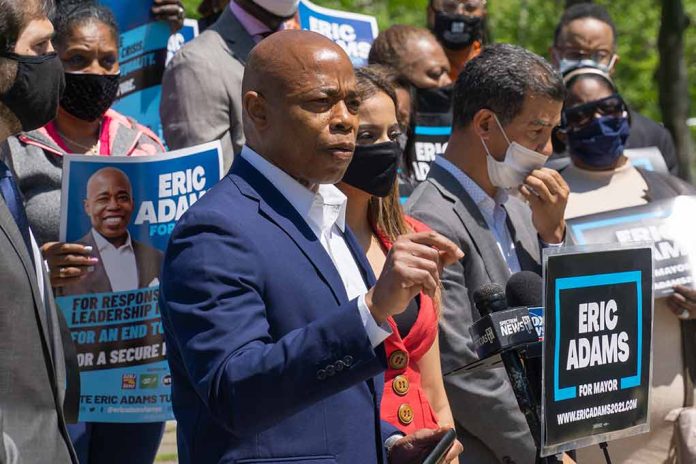
New York City Mayor Eric Adams faces an unprecedented legal situation as federal prosecutors move to drop charges against him, leaving both his personal legal status and mayoral responsibilities in a complex balance.
Top Takeaways
- Federal prosecutors have requested to drop the Justice Department’s case against NYC Mayor Eric Adams.
- The deal is not a typical plea bargain, as Adams has not admitted guilt or pleaded to a lesser charge.
- Charges can be reinstated if Adams doesn’t comply with the agreement, including cooperating with federal immigration policies.
- Several prosecutors resigned rather than proceed with dropping the charges, citing concerns about misuse of prosecutorial power.
- The situation raises questions about the balance between personal legal jeopardy and public responsibilities for elected officials.
Unusual Legal Maneuver Sparks Controversy
In a move that has sent shockwaves through legal and political circles, federal prosecutors have filed a motion to drop bribery and fraud charges against New York City Mayor Eric Adams. This decision comes amidst allegations of a scheme to enrich himself with illegal gifts from Turkish citizens and officials, charges Adams has vehemently denied.
The unusual nature of this legal maneuver has raised eyebrows and sparked heated debate. Unlike a traditional plea bargain, Adams has not admitted guilt or pleaded to a lesser charge. Instead, the government plans to dismiss the corruption charges without requiring an admission of wrongdoing.
Prosecutors Resign in Protest
The decision to drop charges has not been without internal controversy within the Justice Department. Several prosecutors have resigned rather than proceed with dropping the case against Adams. One federal prosecutor, Hagan Scotten, accused DOJ officials of misusing prosecutorial power for influence, stating, “Any assistant U.S. attorney would know that our laws and traditions do not allow using the prosecutorial power to influence other citizens, much less elected officials, in this way.”
This internal dissent highlights the unprecedented nature of the situation and raises questions about the motivations behind the decision to drop charges.
Implications for Mayoral Duties
The deal struck with Adams extends beyond his personal legal status and into his responsibilities as Mayor of New York City. As part of the agreement, Adams has reportedly agreed to cooperate with federal Immigration and Customs Enforcement (ICE) agents, specifically allowing them to interview detainees at Rikers Island.
This aspect of the deal has raised concerns about the potential influence of personal legal threats on mayoral decision-making. Critics argue that such an arrangement could compromise Adams’ ability to act solely in the best interests of New York City residents.
Adams Maintains Innocence
Throughout this process, Mayor Adams has consistently maintained his innocence and denied any wrongdoing. In a public statement, he emphatically declared “I want to be crystal clear with New Yorkers: I never offered — nor did anyone offer on my behalf — any trade of my authority as your mayor for an end to my case. Never.”
Despite Adams’ assertions, the unusual nature of this legal arrangement leaves many questions unanswered and has fueled speculation about potential behind-the-scenes negotiations.
Future Implications and Uncertainties
The dismissal of charges “without prejudice” means that Adams is not entirely out of legal jeopardy. The charges could potentially be reinstated if he fails to comply with the terms of the agreement. The fact that charges would be hanging over the mayor’s head creates an unprecedented situation where an elected official’s policy decisions could be influenced by personal legal considerations.
As this situation continues to unfold, it will undoubtedly spark debates about the proper balance between prosecutorial discretion, political influence, and the responsibilities of elected officials. The resolution of Adams’ case may set precedents that could impact future legal proceedings involving high-profile political figures.






















